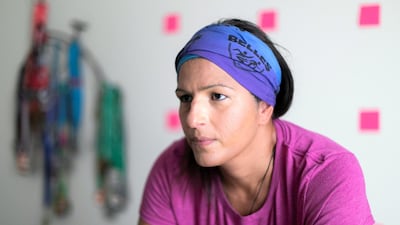Triathlete Melina Timson-Katchis had to give up the life she loved after she caught the coronavirus in May last year.
Now, 10 months later, she is still battling back to health and has started raising awareness about the effects of long Covid.
A small but growing percentage of Covid-19 patients, many of whom initially suffered mild symptoms of the virus, are enduring lasting effects.
A recent study in The Lancet Psychiatry journal found that neurological or psychiatric problems were diagnosed in a third of Covid-19 survivors within six months of infection.
Diagnoses included anxiety and mood disorders, substance misuse and insomnia – and 41-year-old Timson-Katchis is part of those statistics.
"I have turned a corner more recently, which is great, but I do still have some lingering effects of the virus," she told The National.
“The fatigue has improved a lot and the frequency of headaches has reduced, though the intensity is still there.
"One long-lasting effect is the asthma. I have been given the all-clear to train again, but my body isn't responding to exercise in the way it used to.
“I’m still trying to navigate triggers for the asthma but there is a lot of anxiety and nerves about how my body will react to certain situations. It is hard to try to rationalise how life has changed.”
When Timson-Katchis contracted the virus in May last year, her symptoms were mild and flu-like. She had a high fever "but nothing major".
But she was in the small minority of people diagnosed with post-viral syndrome and was left dealing with regular bouts of dizziness, fatigue and breathlessness.
For someone who coaches people on how to live a healthy life, the concept of not being able to move her body as much as she was used to has been tough for the mother-of-three.
More than 10 months on, and although some symptoms have subsided, Timson-Katchis said she is still battling insomnia which is heightening her anxiety levels.
“I never had trouble trying to sleep before but now I tend to wake up in the middle of the night and struggle to get back to sleep,” she said.
“I then wake up tired and it really affects my routine for the day, which is frustrating.
“I think that all adds to my changes in mood but as I have children I do just try to get on with it.”
Timson-Katchis said she has tried mild medication, hot drinks before bed and acupuncture, but none has had a lasting effect on improving her sleep.
While living with long covid has been a “massive learning curve”, she hopes in time symptoms will ease and life will return to relative normality again.
In the study published in The Lancet Psychiatry, researchers looked at 230,000 health records of US patients who suffered from Covid-19.
The most common diagnoses after the infection were anxiety disorders (17 per cent of patients), mood disorders (14 per cent), substance misuse (7 per cent), and insomnia (5 per cent).
Neurological problems were lower, with 2.1 per cent for ischaemic stroke, 0.6 per cent for brain haemorrhage, and 0.7 per cent for dementia.
Risks of a neurological or psychiatric diagnosis were greatest in, but not limited to, patients who had severe Covid-19.







